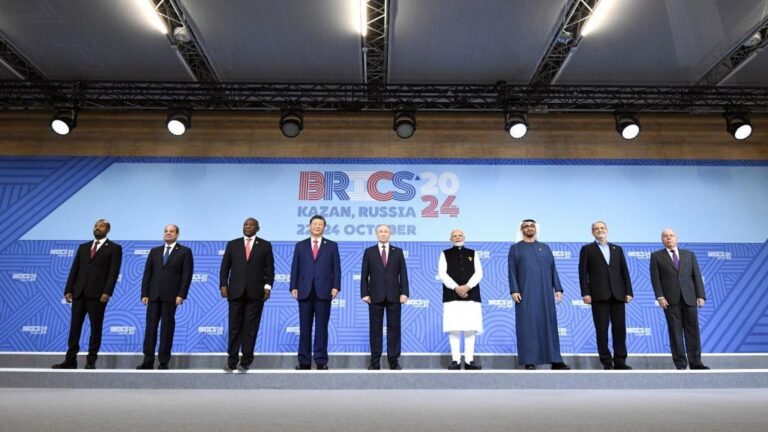BRICS leaders are convening in Brazil this week amid rising global tensions over trade policies, aiming to strengthen their alliance against increasing protectionism. As major emerging economies-Brazil, Russia, India, China, and South Africa-face challenges from shifting international markets and tariff barriers, the summit is viewed as a critical opportunity to present a united front that advocates for more open and balanced global trade. This gathering underscores the bloc’s growing influence in shaping the future of international economic relations.
BRICS Leaders Convene in Brazil to Strengthen Economic Cooperation Amid Rising Global Protectionism
In a decisive move to counteract the escalating wave of global protectionism, BRICS leaders gathered in Brazil to chart a strategic path forward for economic collaboration. The summit serves as a critical platform for Brazil, Russia, India, China, and South Africa to enhance trade partnerships and explore alternative mechanisms that bypass traditional Western-dominated financial systems. Discussions focused heavily on fostering mutual growth through strengthened bilateral trade agreements, diversified investment opportunities, and coordinated policy responses aimed at sustaining open markets amid rising geopolitical tensions.
Key areas of focus at the meeting included:
- Promotion of local currencies in trade settlements to reduce dependency on the US dollar.
- Joint infrastructure projects to improve connectivity and supply chain resilience across member countries.
- Establishment of a unified BRICS development fund to finance innovative technologies and sustainable development initiatives.
| Country | Projected Trade Growth (%) | Key Initiative |
|---|---|---|
| Brazil | 7.5 | Renewable energy partnerships |
| Russia | 6.8 | Energy exports expansion |
| India | 8.2 | Digital infrastructure development |
| China | 7.0 | Supply chain integration |
| South Africa | 5.9 | Mining sector modernization |
Strategic Initiatives Discussed to Counter Trade Barriers and Promote Open Markets
In their upcoming summit, BRICS leaders are prioritizing a series of strategic initiatives aimed at dismantling existing trade barriers and fostering a more inclusive global trading system. Central to these efforts is the push for enhanced cooperation on tariff reductions and the establishment of streamlined customs protocols. Delegates are also expected to advocate for the creation of a joint framework to counteract unilateral trade restrictions imposed by external powers, reinforcing the bloc’s commitment to open, rules-based markets.
Key proposals under consideration include:
- Development of a multilateral trade facilitation agreement to expedite cross-border commerce among member countries.
- Investment in digital infrastructure to support e-commerce and reduce transactional bottlenecks.
- Enhanced dispute resolution mechanisms to address unfair trade practices swiftly and transparently.
| Initiative | Objective | Expected Impact |
|---|---|---|
| Tariff Harmonization | Lower import/export duties | Boost intra-BRICS trade by 15% |
| Customs Modernization | Streamline border procedures | Cut clearance times by 30% |
| Trade Dispute Platform | Faster conflict resolution | Reduce trade friction |
Experts Recommend Enhanced Policy Coordination and Investment in Infrastructure for Sustained Growth
Amid growing economic uncertainties, experts emphasize the imperative for BRICS nations to align their fiscal and monetary strategies more closely. Enhanced policy coordination is seen not just as a means to counteract global trade protectionism but as a strategic avenue to bolster resilience and economic stability within member countries. Analysts suggest that synchronized efforts could address vulnerabilities caused by disparate policy frameworks, helping to maintain steady growth trajectories across these emerging markets.
Investment in infrastructure, particularly in technology and sustainable energy, is underscored as a critical factor for long-term prosperity. Prioritizing projects that improve connectivity and resource efficiency could unlock significant productivity gains and create new employment opportunities. The table below highlights core infrastructure investment areas identified by policy experts as priorities for the BRICS bloc:
| Investment Area | Expected Impact | BRICS Focus |
|---|---|---|
| Digital Networks | Enhanced Trade & Communication | High |
| Renewable Energy | Energy Security & Sustainability | Medium |
| Transport Infrastructure | Improved Market Access | High |
| Water & Sanitation | Public Health & Productivity | Medium |
Collectively, these initiatives could provide a foundational boost to economic collaboration within BRICS, setting a precedent for integrating infrastructure development with broader policy goals.
Insights and Conclusions
As the BRICS leaders prepare to convene in Brazil, the world watches closely to see whether this influential coalition can solidify a united stance against rising trade protectionism. Their ability to coordinate policies and foster cooperation will not only shape the future of global commerce but also signal the shifting dynamics of international economic alliances. The outcomes of this summit may set the tone for how emerging economies navigate the challenges of an increasingly fragmented trade landscape.




